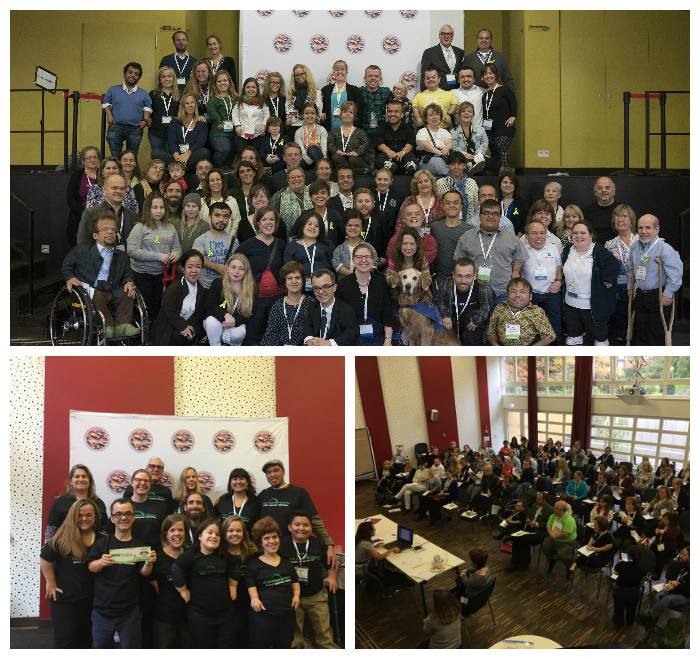LPA organizes first ever International Dwarfism Leadership Summit
On October 15 – 16, 2016, Little People of America facilitated the first annual International Dwarfism Leadership Summit in Berlin, Germany. This summit was organized in an effort to bring together leaders from dwarfism communities around the globe to share information, ideas and experiences in order to improve the lives of Little People everywhere and to lay the groundwork for developing an international network of dwarfism communities. Twenty-two countries were represented by more than 90 attendees - from the Philippines to New Zealand and Poland to Mexico - with everyone expressing pure excitement at the opportunity to sit in the same room and discuss common organizational challenges.

** Attendees organizations and countries are listed below.
The first day of the summit focused on organizational best practices and global awareness. The morning session kicked off with conference participants giving a brief overview of their respective organizations. The presentations led into the discussion on best practices for organizational structure and support. Many leaders from the various organizations were seeking information about how to grow their membership and appeal to specific demographics, like younger people with dwarfism. Amidst the discussion, one participant introduced the concept of the “Dumbbell Issue.” The concept reflects the reality that within many organizations, there is heavy participation among young children and kids, as well as middle aged adults and seniors. Sandwiched in between, there is scarce participation from teens and young adults. From that idea came a valuable group conversation about the need to foster the growth of emerging young leaders who will bring these organizations forward as the twenty-first century unfolds. Another question addressed during this discussion was, “What does membership mean to our constituents?” These days, people can find support and resources, once only available through organizational membership, online with Facebook and other social media outlets. Participants stressed the need to develop new ways to engage members and to empower members to have a role in the organization.
The last section of the meeting on Day 1 was dedicated to global awareness. This discussion gave participants the opportunity to share information about the unique challenges faced by each organization within their specific culture, so that patterns could be identified and common cross- cultural solutions developed. Similar to the first discussion, it was clear that some issues are common to groups around the world. Participants shared concerns about employment opportunities and the impact of employment choices made by individual members, as well as concerns about the portrayal of people with dwarfism in popular culture.
Following the formal agenda on October 15, participants broke for dinner, which was hosted by the Hotel Grenzfall, the same location of the conference. The hotel was an appropriate location for the conference, because it is geared toward the empowerment of people with disabilities. The Grenzfall is noted as the first “integration” hotel in Germany, employing a large number of people with disabilities.
The morning of October 16, Dr. William Mackenzie (Chairman, Department of Orthopaedics, Orthopaedic Surgeon for Alfred I. duPont Hospital For Children, Wilmington, Delaware), and Dr. Julie Hoover-Fong (Director, Greenberg Center for Skeletal Dysplasias, professor in the McKusick-Nathans Institute of Genetic Medicine, clinical geneticist for Johns Hopkins Hospital, Baltimore, Maryland) of LPA’s Medical Advisory Board presented on current standards of care, diagnosis and medical treatment for the complications of various types of dwarfism. During this discussion, many noted the drastic differences in the kinds of care that are available in different countries and the differing opinions within the leadership of those organizations about what sort of care is most appropriate. The medical presentations were followed by an international adoption discussion focused on how organizations can model their own efforts on existing adoption programs so that more of the world’s LP children can find their forever homes. Also, Day Two included an advocacy discussion. LPA presented on several ongoing campaigns, which opened up a discussion about how LP’s are portrayed in the media and methods to combat the often mixed messages that these depictions give the public.
The conference concluded with a brainstorm session about how to keep the conversion going, how to build a communication and action network among communities, and specific steps that could be taken as an international body.
While the weekend was not nearly long enough to discuss all of the challenges facing our communities, plans are already underway for continuing to build this coalition with a future summit. Further, individuals from this group are continuing to communicate and support each other across the miles. There have already been some successes since the summit, including: Little People of Sweden has secured physical office space for the first time, a woman from the Philippines has begun fund raising to create the country’s first dwarfism advocacy and support group, Little People of New Zealand was inspired to write a response to a negative media portrayal, and a number of organizations signed on to celebrating World Dwarfism Day (Oct. 25th) for the first time.
As a response to rapid globalization, LPA is excited to continue to advance this initiative and bring its mission of support, advocacy and pride to the global stage.
**Attendees at the first International Dwarfism Leadership Summit, Berlin Germany 2016.
Asociacion Civil Acondroplasia Argentina (ACONAR), Short Statured People of Australia, BKMF-Austria, Little People of Bulgaria, Little People of Canada, Dværgeforeningen Danmark, Lyhytkasvuiset - Kortväxta ry (Finland), French Little People Association, BKMF e.V. German Association for People of Short Stature, Little People of Ireland, AISAC Onlus (Italy), Gente Pequena AC (Mexico), Dutch Association of Little People (the Netherlands), Little People of New Zealand, Fundacja Rodzic Nie Pęka (Poland), Little People of the Philippines, Association of Little People Romania, Sports PTB (Spain), Fundación ALPE Acondroplasia (Spain), Asociación de Familiares y Afectados de Patologías del Crecimiento (Spain), Association for People of Short Stature Sweden, Dwarf Sports Association (UK), Little People UK, Short Stature Scotland
|


